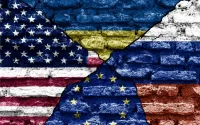Simon JenkinsFebruary 15, 2008
This summer's Beijing Olympics have become another Long March. After the great leap forward, the cultural revolution and a thousand flowers blooming, the people's republic must confront Steven Spielberg's refusal to choreograph its Olympic opening ceremony. He is unlikely to stop the politburo in its tracks. But where democracy is absent, celebrity is all.
Mia Farrow taunted Spielberg in the Wall Street Journal as the Leni Riefenstahl of the "genocide Olympics". An appalled Spielberg resigned as artistic adviser, accusing the Chinese of not doing enough "to end the appalling suffering in Darfur".
China's rulers are presumably meant to quake, staring in despair into their mint tea. What can this mean? What if Angelina Jolie taunts George Clooney? What if Barbra Streisand taunts Tom Cruise? What - merciful Confucius - if Woody Allen taunts Amy Winehouse? Tectonic plates will shift beneath the Forbidden City.
In my experience most artists do not care much about politics so long as the money is right. Architects such as Zaha Hadid and Norman Foster build monuments, indeed entire cities, to flatter the fancies of Asian dictators. Musicians perform for Omani sheikhs. Artists adorn the walls of Dubai. Spielberg doubtless felt honoured to serve the Beijing Olympics and dust them with the glamour of his calling, until the heat was on in Hollywood.
I hate boycotts of all sorts. They hurt the wrong people and rarely work, so I am basically on the artists' side. Art elevates the human spirit, and money lubricates the wheels of change. But a world of difference separates a boycott from sycophantic assistance. If a Chinese communist offered me a crock of gold to write, say, a eulogistic blurb in the Olympics programme, I could not imagine saying yes. These people may be an improvement on their Maoist predecessors, but I would not give them the time of day, let alone take their money.
The Olympics are not essentially about sport, the sports being almost all "minor" ones. The longstanding ploy of the International Olympic Committee in inflating the nationalist significance of the games and thus sustaining the extravagance of the spectacle has made them what Hitler intended, a grotesque display of chauvinism that only the richest states can play.
Britain's Olympics minister, Tessa Jowell, with Tony Blair in attendance, went close to berserk in Singapore in 2005 to "win the games for Britain". The winning was spun as a triumph for Blair's Britain. How else could £9bn of public money be justified for two weeks of elite sport, a large chunk of it for handling just the opening and closing ceremonies?
When Sir Craig Reedie, Britain's IOC member, told the press that "the IOC is a sports organisation and its contract is with the host city, it does not become involved in politics", he was talking nonsense. It is essentially involved in politics. Contracts are underwritten by the Chinese and British governments and the games are drenched in national prestige. Popular sports such as soccer, cricket and rugby do not require ministerial support or huge public outlays.
Mia Farrow's comparison of Beijing with the 1936 Berlin Olympics is not out of order. These are the most political games since then. They were fashioned - and awarded by the IOC - specifically on the basis that if the Chinese squandered enough money, they would be accepted into the community of tolerable nations. They have destroyed swaths of Beijing, evicted thousands of people and sucked some $35bn in public expenditure from a country still mired in appalling poverty and oppression. There is no sign of the promised improvement in human rights.
Ever since then, George Bush, Nicolas Sarkozy and Gordon Brown with his "business leaders" have beaten a cringing path to China's door. Democracy campaigners are thrown into jail. The BBC will blow £1m on a 150-staff junket to promote the games, even as China censors its website. If you are running a fascist state, the Olympics are worth every penny.
In 1980 Britain blatantly acknowledged the political status of the Olympics by refusing "officially" to attend the Moscow games but allowing its athletes to compete "as individuals". The decision was in protest at the Soviet occupation of Afghanistan the previous year. If, as Gordon Brown intends, British troops are still in occupation of that same country in 2012, he can hardly complain if Russia and others find an excuse to return the compliment and boycott the London games.
I imagine we have seen nothing yet of the politics of Beijing 2008. Jowell displayed a note of panic on Wednesday in declaring that a boycott of the games would be "counterproductive". Why should it be more counterproductive than the Moscow protest? And did she not support a sports boycott of South Africa, and a cricket boycott of Zimbabwe?
She claimed that a boycott "would not serve any purpose and would be a great pity". She added weakly that whenever she goes to Beijing, which is almost every year, she "raises issues surrounding" human rights. The reality is that, despite pleas from eight Nobel peace laureates this week to use the games as a lever on Darfur, Britain rejects any call for a boycott - not least from the Justice and Equality Movement, which represents the rebel groups in Sudan. Another argument against boycotts is that they invite such hypocrisy.
Andy Burnham, the new culture secretary, is perhaps closer to the mark in remarking that "you cannot make a clean separation between representative sport and the situation in any particular country". But on this score Darfur is hardly the worst of China's political sins, its alliance with Sudan being chiefly the result of its thirst for oil. Tibet, human rights and internet censorship have yet to raise their cantankerous heads.
The Olympic movement has shielded the games from criticism for seven years as the Chinese poured billions of dollars into the IOC's beloved concrete. The British Olympic Association, presumably after consultation with ministers, outrageously tried to ban British athletes from making political statements. When the Chinese police start beating up athletes, journalists and activists this August, where will Brown, Burnham and Jowell stand: for liberty and human rights, or for the semi-laundered tyrants of Tiananmen Square? It is scarcely credible that a British government should find itself defending the Chinese in such an argument.
This is the mess you get into when you mix sport with politics. At the Moscow Olympics, athletes from the 16 boycotting nations paraded under the Olympic flag in a gesture against the politicising of the games. When they won medals they wanted no national anthems. Needless to say, the IOC looked askance at this, since its future extravagance depended on sustaining chauvinist hysteria.
The only answer, given the rampant politicising of these games, is to regard them as a festival of politics as well as of sport and civil engineering. Having awarded China's communist regime the accolade of the publicity, the world should howl its contempt for its behaviour. Otherwise those present can hardly deny that they are lending their names and their talents to glorify the world's greatest dictatorship.






